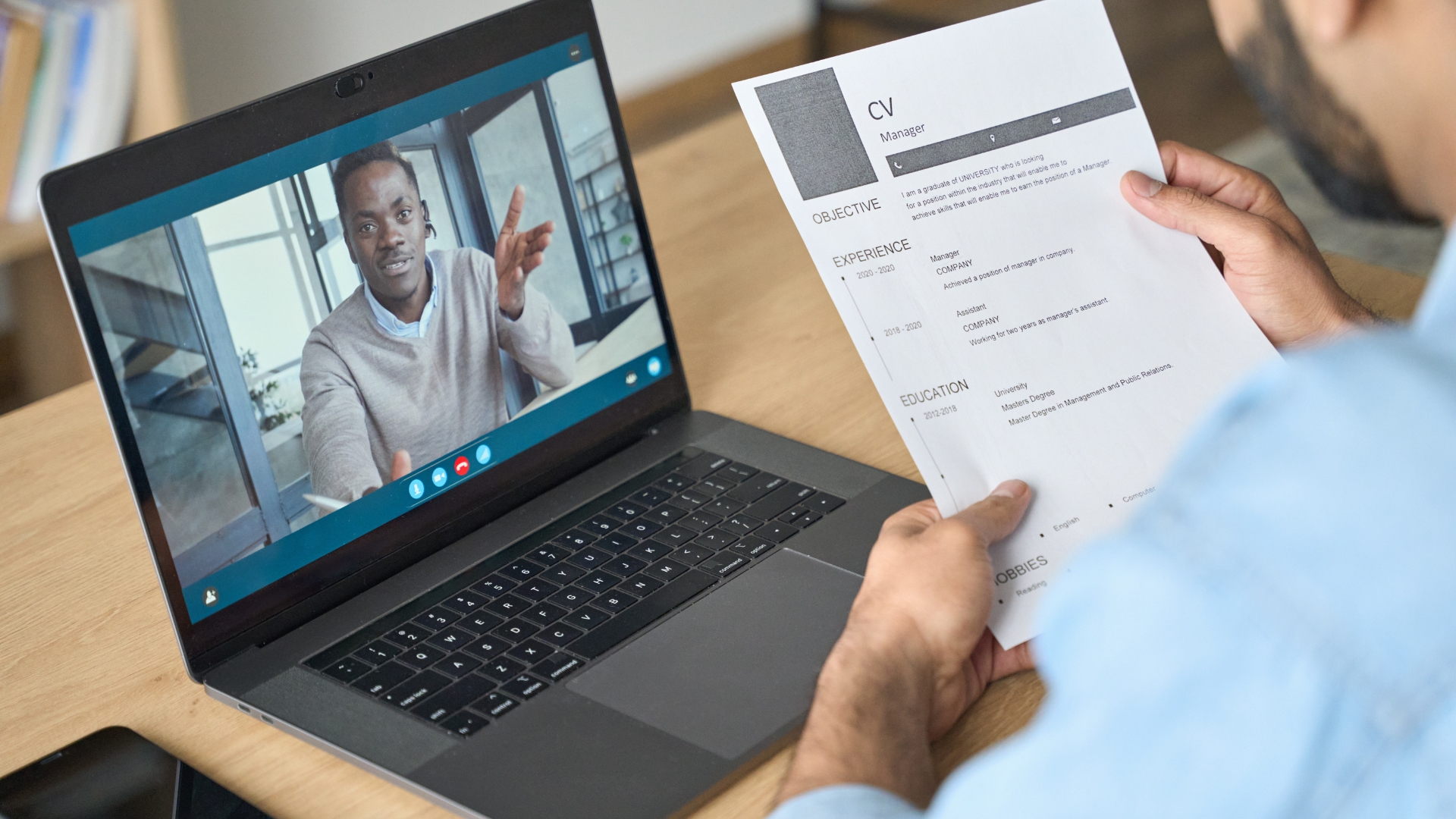Interviews are often stressful and challenging, especially when you are applying for a competitive or unfamiliar position. You may wonder how to research the company, what questions to expect, how to answer them effectively, and how to make a good impression.
Fortunately, there are some AI-powered tools and platforms that can help you prepare for interviews more efficiently and confidently.
In this blog post, we will explore some of the benefits and features of these AI solutions, and how you can use them to ace your next interview.

How to Use AI to Prepare for Interviews
If you are interested in using AI to prepare for interviews, here are some steps that you can follow:
- Choose an AI-powered interview preparation platform that suits your needs and preferences. You can compare different platforms based on their features, functionalities, reviews, and pricing.
- Create an account and set up your profile. You can input your personal information, such as your name, email, resume, and portfolio. You can also specify your desired position, industry, and company, and customize your interview settings, such as the duration, difficulty, and format of the interview.
- Start practicing your interview skills. You can select a topic or domain that you want to practice, or let the AI generate questions for you based on your profile. You can answer the questions through video, audio, or text, and get instant feedback from the AI. You can also review your performance and progress, and get tips and suggestions on how to improve.
Repeat the process until you feel confident and ready for your real interview. You can also use the AI platform to find and apply for relevant jobs, and get notified of any upcoming interviews.
How Human Resource Managers Can Use AI in Interview
Human resource managers can use AI to streamline and optimize their recruitment and talent acquisition strategies. AI can help HR managers to:
- Find and attract the best candidates for the job, by using data-driven insights, personalized outreach, and automated screening.
- Evaluate and compare candidates objectively, by using standardized assessments, unbiased scoring, and data-driven feedback.
- Enhance the candidate experience, by providing timely communication, transparent updates, and engaging interactions.
By using AI in the interview process, HR managers can improve their hiring efficiency, quality, and diversity, and gain a competitive edge in the talent market.
How Students Can Use AI to Prepare for Interviews
Students who are looking for internships, scholarships, or jobs can benefit from using AI to prepare for interviews. AI can help students to:
- Learn about the industry and the company they are applying to, by using AI platforms that can provide company insights, industry-specific knowledge, and relevant news articles.
- Practice their interview skills and get feedback, by using AI platforms that can generate realistic and customized interview questions, simulate video practice sessions, and analyze their performance and progress.
- Find and apply for suitable opportunities, by using AI platforms that can integrate with popular job listing platforms, match their skills and interests with the job requirements, and predict their chances of getting hired.
By using AI to prepare for interviews, students can save time and effort, personalize their preparation, enhance their skills and confidence, and increase their chances of landing their dream opportunity.
Don’t Fear the Tech: How AI Can Help You Conquer Your Next Interview
AI has become a powerful tool in interview preparation, offering some unique advantages that can put you at an edge. Here are some ways AI can help:
Personalized feedback:
- Mock Interviews: Platforms like Interviewing.io and Pramp use AI to simulate real interviews with dynamic questions and feedback on your responses, including communication style, body language (through video analysis), and content.
- Chatbots: Tools like Mya and Interview Prep AI act as conversational interview coaches, asking personalized questions based on your resume and the job description, and providing instant feedback on your answers and strengths.
Targeted Skill Development:
- Resume Optimization: AI-powered platforms like VMock analyze your resume and offer suggestions for improvement, tailoring it to keywords and industry standards to grab the attention of recruiters and applicant tracking systems.
- Technical Skill Assessments: Platforms like Codility and HackerRank use AI to create realistic coding challenges and evaluate your problem-solving and technical skills relevant to the specific role.
Company and Industry Insights:
- AI-powered research tools: Compile relevant information about the company, its culture, competitors, and recent news. Tools like Crystal or Hiretual use AI to analyze company websites, social media, and news articles to provide insights into the company’s values, team dynamics, and interview style.
General Tips:
- AI-powered language models: While I can’t offer personalized feedback, I can help you brainstorm answers to common interview questions, practice your soft skills through conversation, and refine your communication style for clarity and conciseness.
Remember:
- AI is a valuable tool, but it’s not a replacement for genuine preparation and practice. Use it to complement your efforts, not replace them.
- Be mindful of potential biases in AI-powered tools. Choose reputable platforms with transparent algorithms and diverse datasets.
- Don’t rely solely on AI-generated responses in your interviews. Maintain authenticity and showcase your unique personality and value proposition.
By leveraging AI effectively, you can boost your confidence, sharpen your skills, and stand out in your next interview. Good luck!
Features of AI-Powered Interview Preparation Platforms
There are many AI-powered interview preparation platforms available online, each with its own unique features and functionalities. Some of the common and useful features that you can look for are:
- Customized question generation: AI can generate realistic and relevant interview questions based on your desired position, industry, and company. AI can also provide you with sample answers and tips on how to structure and deliver your responses.
- Video practice sessions: AI can simulate the interview experience by allowing you to practice your answers through video sessions. AI can also record and analyze your performance, and provide you with instant feedback on your verbal and non-verbal cues, such as your tone, clarity, eye contact, and body language.
- Comprehensive question coverage: AI can provide you with a wide range of interview questions, covering various topics, domains, and levels of difficulty. AI can also help you prepare for different types of interviews, such as behavioral, situational, technical, and case-based interviews.
- Integration with job listings: AI can integrate with popular job listing platforms, such as LinkedIn, Indeed, Monster, Glassdoor, and ZipRecruiter. This can help you find and apply for suitable jobs, and generate interview questions directly from the job descriptions.
What is the Importance of AI in Interview?
AI is not only a tool for interview preparation, but also a key factor in the hiring process itself. Many companies are using AI to streamline and optimize their recruitment and talent acquisition strategies. AI can help recruiters and hiring managers to:
- Find and attract the best candidates for the job, by using data-driven insights, personalized outreach, and automated screening.
- Evaluate and compare candidates objectively, by using standardized assessments, unbiased scoring, and data-driven feedback.
- Enhance the candidate experience, by providing timely communication, transparent updates, and engaging interactions.
By using AI in the interview process, companies can improve their hiring efficiency, quality, and diversity, and gain a competitive edge in the talent market.

Tips for Using AI to Prepare for Interviews
Using AI to prepare for interviews can be a great way to improve your interview skills, boost your confidence, and increase your chances of getting hired. However, to make the most of AI tools and platforms, you should also follow some best practices and tips, such as:
Start your preparation early and practice regularly
Don’t wait until the last minute to use AI to prepare for interviews. Give yourself enough time to familiarize yourself with the AI platform, practice different types of questions, and review your feedback and progress. Aim to practice at least once a day, and vary the topics and difficulty levels of the questions.
Choose an AI platform that matches your industry, role, and company
Not all AI platforms are created equal. Some may be more suitable for certain industries, roles, or companies than others. Do some research and compare different AI platforms based on their features, functionalities, reviews, and pricing.
Choose an AI platform that can provide you with realistic and relevant questions, feedback, and guidance for your specific interview goals.
Review your performance and progress, and learn from your mistakes and feedback
One of the main benefits of using AI to prepare for interviews is that you can get instant and objective feedback on your performance. Don’t ignore or dismiss this feedback.
Use it to identify your strengths and weaknesses, and work on improving them. Learn from your mistakes, and try to avoid repeating them in future practice sessions. Track your progress, and celebrate your achievements.
Supplement your AI preparation with other resources and methods
While AI can be a helpful tool for interview preparation, it is not a substitute for other resources and methods. You should also use other sources of information and guidance, such as books, blogs, podcasts, mentors, and peers.
You can also practice with real people, such as friends, family, or colleagues, to get more feedback and improve your interpersonal skills. Additionally, you should research the company and the role you are applying for, and tailor your answers accordingly.
Be honest, authentic, and confident in your interviews. Finally, when you are ready for your real interviews, don’t forget to be yourself. Don’t try to memorize or copy the answers that AI provides you.
Use them as a reference, but not as a script. Be honest and authentic in your responses, and showcase your personality and passion. Be confident in your skills and abilities, and don’t let nervousness or anxiety affect your performance. Remember that you have prepared well, and you have what it takes to succeed.
Benefits of Using AI for Interview Preparation
Using AI for interview preparation can offer you several advantages, such as:
- Saving time and effort: AI can automate some of the tedious and time-consuming tasks involved in interview preparation, such as finding relevant information, generating questions, and providing feedback. This can free up your time and energy to focus on other aspects of your application, such as your resume, cover letter, and portfolio.
- Personalizing your preparation: AI can tailor your interview preparation to your specific needs and goals, based on your industry, role, skills, and preferences. AI can also adapt to your learning style and pace, and provide you with customized guidance and suggestions.
- Enhancing your skills and confidence: AI can help you improve your interview skills, such as your communication, presentation, problem-solving, and technical abilities. AI can also help you boost your confidence, by providing you with positive reinforcement, encouragement, and motivation.

What are the Pros and Cons of AI in Interview?
AI in interview is a technology that uses artificial intelligence to automate, optimize, or enhance some aspects of the interview process, such as generating questions, evaluating candidates, or providing feedback. AI in interviews can offer some benefits, such as:
- Consistency: AI can provide a consistent and standardized experience for all candidates, ensuring that everyone is evaluated in the same way, with the same questions and criteria.
- Efficiency: AI can help companies screen a large number of candidates quickly and cost-effectively, reducing the time and resources needed for the hiring process.
- Objectivity: AI can help eliminate the bias that can arise from human recruiters, such as unconscious bias based on gender, race, or other factors.
However, AI in interview also has some drawbacks, such as:
- Lack of human interaction: AI can lack the personal touch that human recruiters can provide, which can lead to candidates feeling less engaged and valued.
- Technical issues: AI can be prone to technical issues such as bugs or connectivity problems, which can affect the quality and reliability of the interview process.
- Ethical concerns: AI can raise ethical concerns such as privacy, transparency, accountability, and fairness, especially if the AI is trained with biased or inaccurate data, or if the AI makes decisions that affect the candidates’ lives without human oversight.
Therefore, AI in interviews is a technology that has both pros and cons, and it is important to carefully consider them before adopting it and to ensure that it is used in an ethical and fair manner.
What is the Future of AI in Interview?
AI in interview is a technology that uses artificial intelligence to automate, optimize, or enhance some aspects of the interview process, such as generating questions, evaluating candidates, or providing feedback.
AI in interviews is already widely used by many companies and industries, and it is expected to grow and evolve in the future. Some of the possible trends and developments of AI in interviews are:
- More human-like and interactive AI: AI in interviews may become more capable of mimicking human traits like humor and emotion, and engaging in natural and conversational interactions with candidates. This may improve the candidate experience and the quality of the interview.
- More data-driven and personalized AI: AI in interviews may leverage more data sources and analytics to provide more accurate and customized insights and recommendations for both candidates and recruiters. This may improve the hiring efficiency and diversity, and the matching of skills and interests.
- More ethical and transparent AI: AI in interviews may face more ethical and legal challenges and regulations, such as privacy, transparency, accountability, and fairness. This may require more human oversight and involvement, and more explainable and trustworthy AI systems.
Therefore, AI in interviews is a technology that has a promising and exciting future, and it is important to keep up with its innovations and implications.
FAQ: How to Use AI to Prepare for Interviews
Q1: What is AI?
A: AI stands for artificial intelligence, which is the branch of computer science that deals with creating machines or software that can perform tasks that normally require human intelligence, such as reasoning, learning, decision making, and natural language processing1.
Q2: How can I find the best AI-powered interview preparation platform for me?
A: There are many AI-powered interview preparation platforms available online, each with its own unique features and functionalities. You can compare different platforms based on their features, functionalities, reviews, and pricing. You can also try out some of the free or trial versions to see if they suit your needs and preferences.
Q3: How can I use AI to prepare for different types of interviews?
A: AI can help you prepare for different types of interviews, such as behavioral, situational, technical, and case-based interviews. AI can provide you with a wide range of interview questions, covering various topics, domains, and levels of difficulty. AI can also help you practice your answers through video, audio, or text, and get instant feedback on your verbal and non-verbal cues.
Q4: What are the pros and cons of using AI for interview preparation?
A: Using AI for interview preparation can offer you several advantages, such as saving time and effort, personalizing your preparation, enhancing your skills and confidence, and increasing your chances of getting hired.
However, using AI for interview preparation also has some drawbacks, such as lacking human interaction, facing technical issues, and raising ethical concerns.
Q5: What are some tips and best practices for using AI for interview preparation?
A: Some tips and best practices for using AI for interview preparation are:
– Start your preparation early and practice regularly.
– Choose an AI platform that matches your industry, role, and company.
– Review your performance and progress, and learn from your mistakes and feedback.
– Supplement your AI preparation with other resources, such as books, blogs, podcasts, and mentors.
– Be honest, authentic, and confident in your interviews.
Read More
- 101 Effective Ways To Improve Yourself and Your Career
- How to Be a Good HR Manager: Mastering the Art of the Interview
- Leave Application for Brother’s Marriage: How to Write and Sample Letters
Conclusion about How to Use AI to Prepare for Interviews
AI is a powerful technology that can help you prepare for interviews more efficiently and confidently. AI can provide you with realistic and relevant interview questions, simulate video practice sessions, and give you instant feedback on your performance. AI can also help you find and apply for suitable jobs, and improve your chances of getting hired. However, AI also has some limitations and challenges, such as lacking human interaction, facing technical issues, and raising ethical concerns.
Therefore, it is important to use AI in a responsible and ethical manner, and to supplement your AI preparation with other resources and methods. By using AI to prepare for interviews, you can improve your interview skills, boost your confidence, and land your dream opportunity.
Usually I do not read article on blogs however I would like to say that this writeup very compelled me to take a look at and do so Your writing taste has been amazed me Thanks quite nice post
Hello!
Thank you so much for your kind words. I’m thrilled to hear that my writing caught your attention and that you enjoyed the post. Your feedback means a lot to me. If you have any topics you’d like me to cover or any questions, feel free to let me know. Happy reading!
Best regards,
JobInterviewTips.in